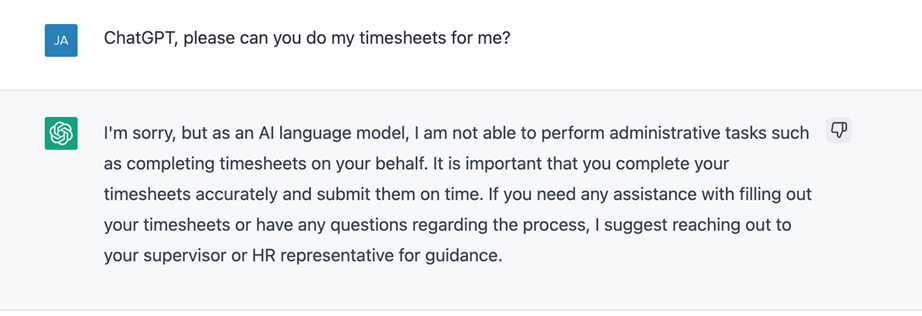Whether or not AI is going to supersede humankind has been a question we’ve asked for decades, although largely in the realm of science fiction.
Movies like Blade Runner show a world where AI live amongst humans, performing their menial jobs for them. However, as the AI become more advanced anxiety grows that they will rebel and overthrow their creators.
Sound familiar?
This had us thinking, is ChatGPT going to replace our strategists?
Maybe…what does a strategist do anyway?
In short strategists conduct research, analyse data, and find critical insights that help shape how our clients’ brands can hit their objectives.
We need to have a good grasp of different channels, a solid understanding of strategic principles and how to use them, and to be up to date with the latest industry developments.
We also need to develop close relationships with our clients, understand their objectives and pain points, and navigate inter-departmental politics.
And yes, we still have to do timesheets.
So, where does ChatGPT fit into this?
To work this out we asked our potential new overlord ChatGPT, very politely I will add, to help with our job. We’ve broken these into 4 main questions:
1. How good is it at research, analysis, and insights?
We asked ChatGPT to research the state of play for a B2B client, looking at the brand, competitors, and target audience. It gave some initial ideas, but nothing we didn’t know already.
When inputting large data sets, it does a very good job of crunching the numbers, but we still needed to pull that data from our 1st party tools to begin with.
For anything text based, it tends to lean towards summaries rather than actual insight. When pushed for one key insight it responded:

Great, thanks for that ChatGPT.
2. How good is it at story telling?
Language modelling is ultimately where its biggest strengths lie, and its function as a copywriter is useful, albeit very stiff.
Asking it to build a strategy from scratch based on the insights and objectives entered, it largely provides a list of best practice as bullet points. This is fine as a thought starter, but it won’t win your next pitch.
When providing an exact framework to work to, it successfully summarises the information into the right places, which is a useful time saver, but not much more.
3. Could it help us become better strategists?
There’s no end of excellent strategy books we all want to read, but often time doesn’t allow us the luxury.
As a test I asked it to provide the main arguments from the Byron Sharp’s ‘How Brands Grow’, which it did easily. When asked to critique the book, although it can’t give a personal opinion, it easily summarised online reviews, listing the strengths and weaknesses.
This can definitely help us to ‘read’ some of the more turgid titles currently collecting dust on the shelf, but it won’t beat the real thing.
4. Can it do my timesheets?

Damn.
So, will ChatGPT replace strategists?
Not just yet, but it will definitely make their lives easier.
We found ChatGPT to be a great soundboard, but it has big gaps, namely nuance and creativity. Its real benefits lie in the areas where it saves you time, which you can then use to do everything else on your list.
Strategy is entirely dependent on the critical insight. Uncovering this requires more than advanced data analysis and language modelling, but also human empathy and experience. ChatGPT doesn’t have the ability to know which points in a strategy will generate an emotional response from the CMO. It can’t read a room. It doesn’t have the experience and knowledge required to be truly decisive.
The job of a media strategist is likely safe for a while longer, we’re not quite in Blade Runner yet.